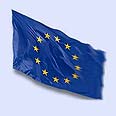
EU fails to demand Lebanon ceasefire
European Union for immediate end to fighting in Middle East but fails to demand formal ceasefire straight away; ‘the most important thing is that no weapons will be fired,’ Finnish Foreign Minister Erkki Tuomioja told reporters
Papering over lingering differences, the EU's Finnish presidency said that an emergency meeting in Brussels of the 25-member bloc's foreign ministers had laid the foundations for a peace plan to be reached at the United Nations.
"The Council (of EU ministers) calls for an immediate cessation of hostilities to be followed by a sustainable ceasefire," Finnish Foreign Minister Erkki Tuomioja told reporters after three hours of talks.
When asked repeatedly to explain the difference between the two, he said curtly: "The most important thing is that no weapons will be fired."
But even as the EU issued its compromise call, Prime Minister Ehud Olmert said Israel would not agree to a ceasefire in its three-week offensive until "conditions on the ground" change.
Lebanon's state High Relief Committee said on Tuesday that Israeli attacks on the country had killed 828 people and 3,200 wounded in the last three weeks.
Hizbullah's fighters are reported to have fired up to 1,900 rockets at northern Israel, killing 18 civilians and wounding more than 300 people.
'An important step'
After the wrangling in Brussels, where Britain, Germany and The Netherlands rejected an "immediate ceasefire" call, the ministers urged the UN Security Council to convene rapidly to pave the way for a peacekeeping force.
"We are now engaged concretely for both the political solution and the international force. So we have the outlines of a comprehensive peace plan now and I believe that this represents a step forward," Tuomioja said.
"Once such a framework has been established -- and we are hopefully talking more about days rather than weeks -- EU member states have indicated their readiness to contribute to such an operation," he said.
French Foreign Ministe Philippe Douste-Blazy welcomed the EU agreement, which builds on a draft document that France has been circulating at the United Nations, saying the bloc had spoken with "one voice."
"It is an important step," he said, calling it "an important victory for French diplomacy."
In their conclusions, the ministers also expressed solidarity with Lebanon and called on all parties to ensure "secure and efficient passage for the delivery of humanitarian assistance."
'There are no divisions in the European Union'
The difficulties with the document typified the problems that confront EU presidencies as they try to satisfy all 25 members, but the wording had added importance given Israel's reaction to an international conference last week.
An Israeli minister said that talks between world powers in Rome, which broke up without agreement on a ceasefire call, effectively gave it "authorization" to press on with its offensive in Lebanon.
The Finnish minister said the new EU call was clear. "I am sure that there can be no misinterpretations after this," he said.
After the talks ended, British Foreign Secretary Margaret Beckett played down any sense of strain.
"There has been a call all the way through for the EU to be united and effective," she told reporters, stressing that other ministers also questioned the draft calling for an "immediate ceasefire."
"A number of my colleagues ... said that what we wanted was something that could be sustained," she said. "I didn't resist anything. ... We all want to see an end to the violence."
Tuomioja added: "I can confirm there are no divisions in the European Union."










